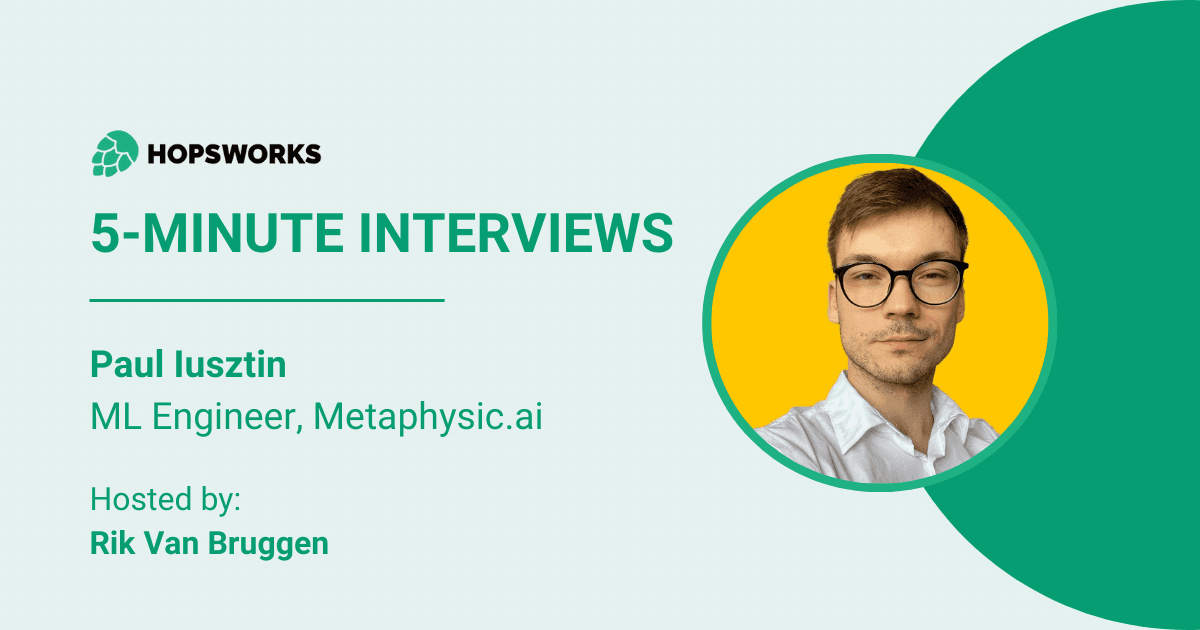5-minute interview with Paul Iusztin
Meet Paul Iusztin, ML Engineer at Metaphysic.ai and content creator. He talks about his journey to becoming an ML Engineer and why he started creating content about MLOps and ML systems.

“I would like to slowly shift the thinking of machine learning from a research perspective to a machine learning engineering and mlops perspective.”
In episode six of 5-minute interviews we meet Paul Iusztin, Senior Machine Learning Engineer at Metaphysic.ai. Paul talks about his journey to becoming a ML engineer and how he came to be an online MLOps advocate.
Tell us a little bit about yourself:
Paul: My name is Paul Iusztin, I am based in Romania and currently working as a ML engineer contractor at Metaphysic.ai. I am also a content creator who talks a lot about Machine Learning (ML), Machine Learning (ML) systems and MLOps in general. Usually, I focus on hands-on production ready stuff as I try to speak about what I actually do in the industry and how I apply my skills. I’m trying to change how people usually talk about research, because in machine learning a lot of people talk from a research perspective. I would like to slowly shift the thinking of machine learning from a research perspective to a machine learning engineering and MLOps perspective.
How did you get into Machine Learning?
Paul: I actually started as a software engineer, but I always knew that I wanted to work in the field of machine learning. But where I am located (Romania), the world of AI was kind of limited at the time. I took the first job that had AI and machine learning in it, and I actually ended up in a machine learning research position at Continental where I started researching 3D object detection and computer vision for autonomous driving. In that position I realized I don’t like research so I switched to a machine learning position which, out of luck, was a machine learning engineer position (where you mostly had to build stuff). At the time I was young and it wasn't very clear to me what a data scientist, a machine learning engineer or MLOps was, I don't think it was clear in the industry either at that moment. So I was lucky to get this new perspective.
After a few months of doing that I got this idea of remote work and contracting and then the pandemic hit and because of this a lot of remote jobs opened, so I jumped on this train and started working for a small startup in Israel. There I had the chance to learn a lot about ML and MLOps because they wanted to build an in-house MLOps system that can be hooked to the products that they were building. So that job was also an eye opener for me. Now I’m currently working for Metaphysics. While working there I started, as a hobby, to do content creation on LinkedIn. After a year, I realized that people actually were interested in what I was talking about, so now I want to grow it as a business and that's what I'm currently focused on.
Is there a domain within the ML/MLOps field that you have a particular affinity for?
Paul: I guess this is a blessing and curse, but everything I’ve been doing so far has been in productionizing machine learning so I didn't get the chance to take on a specific domain. But in the last month I’ve been looking a lot at Generative AI so this is something I would like to specialize in; MLOps and ML systems in Generative AI.
What do you find fascinating about ML and MLOps?
Paul: I have had an affinity towards robots since I was a child. In my opinion machine learning is the closest thing to robots that we currently have. I guess it was this plus a combination of hype. In all transparency, I think a component for me was that it was the hot thing at the moment. I also love challenges and I get bored very easily, so in machine learning you have a continuous flow of challenges that you have to solve which is very entertaining for me.
Do you have any interesting resources to recommend?
Paul: I can answer this question in two parts. So the first thing is, since this field is moving so fast, you will always lose the battle of trying to keep up. Start to focus on the fundamentals. If you master the fundamentals, then when you have a specific problem you can very easily pick up the specifics and read what the exact thing is that you need for that problem.
The second thing is that you don't want to read too much, you also want to practice. So you want to make sure to combine the two and have a good read and practice cycle**.** Some specific resources that I would suggest are two books that I really love. The first one is called “Machine Learning Design Patterns“ which is mostly focused on ML systems and the second one is called “Designing Machine Learning Systems” by Chip Huyen and focuses on MLOps, but both books overlap a bit from time to time.
Listen to this and other episodes on Spotify: